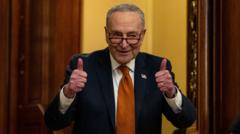In a significant legal maneuver, President Biden has recently commuted the death sentences of 37 federal inmates, a decision that stands in stark contrast to the anticipated policies of former President Donald Trump, who plans to expand the use of the death penalty upon taking office. This move from Biden, seen by many human rights advocates as progress, ignites fierce criticism from the Republican camp, underscoring the polarized landscape surrounding capital punishment in the United States.
Biden’s Commutations Versus Trump’s Execution Plans: A Divisive Legal Landscape

Biden’s Commutations Versus Trump’s Execution Plans: A Divisive Legal Landscape
As President Biden commutes death row sentences, the stage is set for a contentious battle over capital punishment with Trump's return to power on the horizon.
On Monday, Biden enacted life sentences without parole for the majority of federal death row inmates, leaving only three individuals, including the Boston marathon bomber and the perpetrator of a mass shooting at a Pittsburgh synagogue, to remain under the death penalty. This action has garnered commendation from human rights organizations like Amnesty International, who view it as a triumph for justice reform. Conversely, prominent Republican figures and Trump's transition team have vociferously condemned Biden's actions, framing them as a betrayal of victims and a dangerous concession to criminals.
President Trump’s expected return to the White House has rekindled discussions around federal executions, an area he has aggressively pursued previously. Trump has indicated intentions to broaden the scope of the death penalty, including making those convicted of a range of violent crimes eligible for capital punishment. His controversial statements assert that increased use of the death penalty is necessary to combat crime and societal upheaval, a perspective that is poised to evoke significant legislative and legal challenges.
In the backdrop of Biden's commutations, Trump's rhetoric around capital punishment raises alarm bells among human rights advocates. They warn that his policies may foster a climate conducive to increased state-level executions, as state leaders could feel inclined to adopt harsher measures in alignment with federal directives.
Moreover, Trump's goals of altering laws to expand the death penalty raise serious questions about legality and ethics. Significant legal precedents have emerged restricting the application of capital punishment to violent offenses resulting in death, and moving forward with such expansions would likely require congressional action, a prospect that appeared improbable given recent failures of related legislative efforts.
As these two very different approaches to capital punishment collide, the United States potentially faces a new chapter of partisan division over justice and the application of the death penalty, marked by uncertainty in the courts and among public opinion, where a slim majority still supports capital punishment for murder.
While the future of the death penalty in America remains uncertain, the ongoing debate is bound to invoke passionate responses across the political spectrum as both legal and moral implications are scrutinized in light of Biden's recent decisions and Trump's impending return to power.
President Trump’s expected return to the White House has rekindled discussions around federal executions, an area he has aggressively pursued previously. Trump has indicated intentions to broaden the scope of the death penalty, including making those convicted of a range of violent crimes eligible for capital punishment. His controversial statements assert that increased use of the death penalty is necessary to combat crime and societal upheaval, a perspective that is poised to evoke significant legislative and legal challenges.
In the backdrop of Biden's commutations, Trump's rhetoric around capital punishment raises alarm bells among human rights advocates. They warn that his policies may foster a climate conducive to increased state-level executions, as state leaders could feel inclined to adopt harsher measures in alignment with federal directives.
Moreover, Trump's goals of altering laws to expand the death penalty raise serious questions about legality and ethics. Significant legal precedents have emerged restricting the application of capital punishment to violent offenses resulting in death, and moving forward with such expansions would likely require congressional action, a prospect that appeared improbable given recent failures of related legislative efforts.
As these two very different approaches to capital punishment collide, the United States potentially faces a new chapter of partisan division over justice and the application of the death penalty, marked by uncertainty in the courts and among public opinion, where a slim majority still supports capital punishment for murder.
While the future of the death penalty in America remains uncertain, the ongoing debate is bound to invoke passionate responses across the political spectrum as both legal and moral implications are scrutinized in light of Biden's recent decisions and Trump's impending return to power.



















